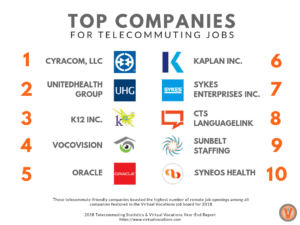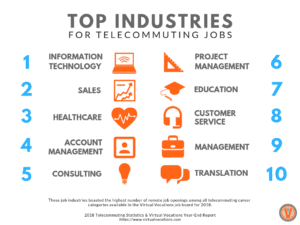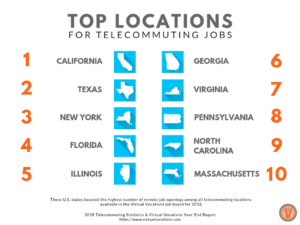The number of opportunities to work remotely outside of a traditional office setting have never been greater. Many companies are now recognizing the allure of working from home and have begun to offer more remote positions. But is remote work right for you? And how is applying to a remote job any different than applying to a traditional job? In this article we examine the benefits and drawbacks of remote work, as well as ways to find, apply for, and obtain remote jobs.
Benefits of Remote Jobs
The main benefit that workers cite when it comes to working remotely is flexibility, which manifests itself in a variety of ways. While some may prefer more structure in their work life, remote work may be an enticing option for those who want or require the option to work when and where they choose.
Time Flexibility
Working remotely affords workers greater freedom in determining when they want to work. While there may be occasional virtual meetings that you have to attend, remote work in general allows you to plan your work around other activities rather than vice versa. This may be especially valuable to workers such as parents and students who have other major responsibilities. It also may be beneficial for those who want to spend more time with family or traveling.
Location Flexibility
As the name suggests, remote work allows workers to work where they want. This may be of particular advantage to workers who dislike the traditional office setting or are constantly on the move. Being able to work at home or a nearby coffee shop also cuts down on time spent on commuting.
Productivity
Though it may sound counterintuitive, studies have shown that remote workers tend to actually be more productive than their traditional counterparts. According to one survey, 65% of workers surveyed were more productive in their home office than in a traditional setting. This makes more sense if you consider that remote workers have the ability to structure their schedule and environment in a way that best suits them, with less distractions and interruptions.
Saving Money
Working remotely may help workers to save money up to $4000. Not having to commute, for example, cuts down on the cost of gas and car maintenance for those who drive, or the cost of public transportation for those who take the bus or train. It also reduces transportation-related carbon emissions. Remote work can also save money in the areas of dry cleaning (remote workers do not have to wear professional clothing) and food (remote workers can eat at home more easily).
Drawbacks to Remote Jobs
Just as not everyone views the benefits of remote work in the same way, some may see certain aspects of remote work as drawbacks while others think little of them.
Difficulty in Maintaining Focus
Workers may find it challenging to concentrate on their work outside of a typical office setting, especially if the work environment is full of distractions. Children, household tasks, and the internet all have the potential to eat up time and reduce productivity, especially if no one is around to monitor your progress. It is important to find a place where you know you can focus, whether in a home office or at a local library.
Loneliness
Without daily interaction with other workers, it is normal to feel alienated from the work process. One remote worker testified to feeling like he was treated las a second-class citizen by non-remote workers in his company. Finding communities outside of work and getting out of the house at least once a day are possible ways to combat this feeling.
Blurring of Work and Life
For workers who do not go to an office building in the morning and come back at night according to a fixed schedule, it may feel like work never stops. This may leave remote workers vulnerable to overworking, especially if they are expected to always be available even outside of normal working hours. In order to combat this, workers may find it helpful to establish a personal working schedule tailored to their individual needs. It is also important to intentionally set aside time for non-work activities, such as vacations, and be able to disconnect from work-related responsibilities.
Trends in the Remote Job Market
Remote work opportunities have been rapidly growing in the past decade. In 2019 the number of remote workers in the United States was estimated to stand around 4.7 million. This is a 20% percent increase from 2015. This number will likely only increase as time goes on. Eighty percent of firms reportedly plan to increase their flexible workforce, and Upwork estimates that 73% of teams will include remote workers by 2028.
Virtual-Friendly Companies, Industries, and Locations
Some industries make more sense than others for remote jobs, though you can find remote jobs in fields you would never expect, including neurosurgery and environmental conservation. More typical remote jobs include marketing, software development, data entry, graphic design, research, and writing.
These graphics illustrate some of the top companies, industries, and locations for telecommuting jobs. However, it is important to keep in mind that there are plenty of opportunities outside of the companies, industries, and locations listed here as well. If you are a paralegal in Hawaii not interested in working at one of the top ten companies listed here, you too can find a remote job!






Virtual Job Boards
These are some helpful search engines specifically for virtual jobs:
Flexjobs
As the name implies, Flexjobs is useful for finding all types of flexible jobs, including remote, part-time, and freelance positions. The website is well laid-out and also has a free blog with lots of useful information. Unfortunately, subscription is required to access the full list of jobs and is fairly expensive ($15/month).
Remote.co
Remote.co, in addition to a list of remote job openings, has a large number of interviews with both companies and remote workers that deal with nearly every facet of remote work. It is a great resource for learning more about the pros and cons of remote work and how to cope with them. Though it does not have as many postings as some other websites, the website is easy to navigate and, best of all, is free!
Upwork
Upwork offers a variety of different job opportunities for freelancers. This site is unique in that candidates bid on positions based on how much they are willing to accept, and employers choose the best candidate based on their experience and bids. It can be competitive, however, to find jobs, which is important to keep in mind.
Virtual Vocations
Virtual Vocations is a great resource not only for looking for jobs but also for finding more tips related specifically to remote work. The website has a regularly updated blog that offers a lot of insight into current virtual job conditions. Premium subscriber access is expensive ($15 a month), but you can still do a lot just with a free account.
We Work Remotely
Billing itself as “the largest remote work community in the world,” We Work Remotely is another free website that offers a variety of jobs, though perhaps not as many as the paid websites, as well as a variety of resources.
Traditional Job Boards
Another option besides looking for virtual jobs on the search engines listed above is to check typical career boards like LinkedIn, Indeed, Monster, and Glassdoor. Some keywords you can use to locate remote jobs include “remote,” “telecommute,” “freelance,” “virtual,” and “flexible,” which will help you to locate jobs outside of the traditional office setting.
It is important when browsing these boards for virtual jobs, however, to be on the lookout for scams. It has been estimated that there are up to 60 scams for every legitimate remote job! Jobs that promise a large amount of money for minimal work or that do not list many details about the position have a higher chance of being scams. Make sure to research companies and do a background check using reliable sites like the Better Business Bureau before applying. If “employers” ask you to provide personal or financial information (e.g. social security number, credit card number, bank account) during the job search or interview process, run the other way.
Résumé Tips for Remote Jobs
When applying for a remote job, it is important to highlight certain skills to show that you are capable of working remotely. As with all jobs, employers want to know that you will add value to their company by being productive, even in a remote setting. Using these keywords, along with other keywords listed in the job description of whatever position you are applying for, will help your resume to attract the attention of employers.
Previous Remote Job Experience
This internship is great to highlight to show that you are familiar with working in a virtual setting. Showing that you have experience thriving in a remote position will demonstrate to employers that you are capable of being productive in a remote job. For example, you might write something along these lines, filling in the specifics for your own situation: “In my previous internship I worked ten hours a week in a virtual setting while taking classes and serving in my local community. I demonstrated initiative through taking up unclaimed projects and collaborated with other interns from around the country via digital media to meet deadlines for important tasks.”
Time Management
Without a fixed schedule, remote workers may find it challenging to stay focused on their work or struggle to meet deadlines. Emphasizing your ability to work ten hours a week and stay on track in a virtual internship will show employers that they can trust you to get work done on time.
Self-Motivation
As you are probably aware by now, one of the most important qualities of a virtual worker is the ability to work without always being directed and supervised. Employers want to know that virtual employees will be productive even when they are not working in a traditional office setting with other employees around them.
Communication
Given how easy it is to disappear from a virtual job, it is important to show that you are an effective and frequent communicator so that your employer knows you will not suddenly go AWOL. Again, highlighting your frequent communication with other interns and supervisors and your knowledge of digital communication platforms such as Slack, Trello, and Zoom throughout this internship could be helpful.
Problem Solving
Of course, this skill is valuable in almost every job. However, it is especially important in a virtual setting, where it often takes more time to receive feedback from a supervisor and where technological problems have the potential to cause more trouble. Showing that you are able to work out problems independently signals to employers that you are an effective problem solver in a situation in which you are not constantly being supervised.
Additionally, you might want to consider adding a brief statement to your resume that shows you are passionate about remote work specifically and will be more productive in a remote capacity. This could help distinguish your resume from those who have similar skills but do not seem as enthusiastic about working remotely.
Potential Interview Questions for Remote Jobs
If you are interviewing for a remote job, either in-person or–more appropriately–virtually, you are likely to be asked some typical questions related specifically to your ability to work remotely:
Why do you want to work remotely?
While there will probably be a variety of possible answers to this question, make sure you have a valid reason for wanting to work remotely rather than simply not wanting to go outside. You may have children to take care of, or want to take time to travel and grow personally. You can also point to how much you enjoyed this internship (assuming you honestly do enjoy this internship) as an example of why you think remote work is right for you. Importantly, employers will want to hear how working remotely will increase your productivity, thus adding value to the company.
How do you stay productive?
Employers want to know how you manage to deal with distractions. For example, they may ask how you respond if your child is running around the house, or your roommate brought friends over and is talking very loudly. Having a strategy for dealing with your specific circumstances will allow you to be prepared to answer this question as well as be prepared for when distractions actually do arise during your work.
How will you ensure that you maintain focus?
Highlighting your ability to be a self-starter, to stay motivated, and to manage time well even when you are unsupervised will help assure your employer that you can be trusted to do your work outside of a traditional office space. You might want to include examples of times that you were able to successfully complete projects independent from outside management, whether you created a VOD in this internship or you finished a project in school before the deadline. It is also important to show employers that you have somewhere where you know you will be able to focus. Consider, for example, where you do most of your work for this internship, whether at your dorm desk, a home office, or the local library.
How well do you communicate?
Employers want to know how proactively and how appropriately you communicate your needs and ideas. For example, they may ask you how you would respond if you were unsure about how to complete a task. They want to know that you will actively communicate your problems to your supervisors when they arise, but also that you will not pester them with questions that you could answer on your own. Again, giving an example of a time you used communication to solve a problem in this internship will help show that you are able to strike a balance between these two extremes.
Questions to Ask for Remote Jobs
If you have the opportunity to ask questions during the interview, these are some things you might want to consider asking to demonstrate your interest in the company:
How does your team communicate?
This shows that you are interested in engaging with other members of the team and are an active communicator. It is also a chance for you to discover whether you will need to become proficient with any new platforms or tools.
What is the company culture like for remote workers?
In asking this question, you will communicate that you care about the culture of the company rather than just making money. This question also gives you the chance to discover whether the company culture includes remote workers or treats them like outsiders.
When and where do other remote workers work?
This gives you an indication of what life looks like for other remote workers at the company and allows you to get a sense of what your schedule at this company might look like.
How does the company track productivity?
This internship requires ten hours of work every week. Other companies may use other metrics to track productivity, such as whether workers complete their projects on time. This question shows that you have experience in the virtual work world and allows you to evaluate how much freedom you would have as a worker.
How often should I check in with my employer?
Through asking this question, you show that you are interested in transparent communication. The answer to this question is an indication of how closely the company supervises or supports its workers.
Want to Learn More?
LinkedIn Learning has an hour-long course dedicated to the topic of finding a remote job. Much of the information provided in this document was taken from the course. If you have access to this resource, it is a great and engaging tool for learning more about the topics discussed here.
Other Sources
Questions to Ask in a Virtual Job Interview
Interested in joining the DME Interns team? Click here to find out more and sign up to be notified when applications open!




